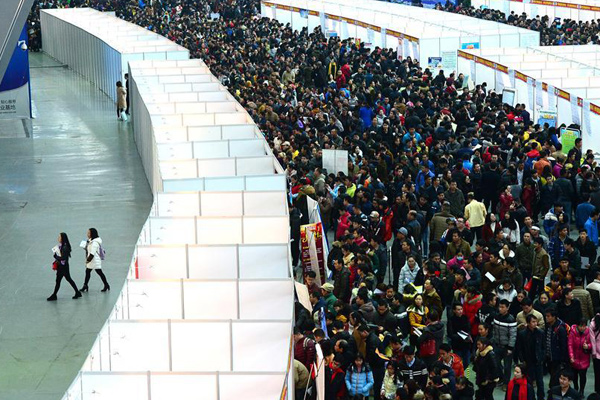Commuting offers alternative option for megacity workers
 |
|
Commuters use smartphones on inter-city rail links between Shanghai and neighboring cities in Jiangsu and Zhejiang provinces, which are becoming more acceptable for homebuyers working in Shanghai, a metropolis with the highest home price and rental cost in China. [Photo / Agencies] |
Becoming a trans-city commuter has become a solution for many young professionals who work in major cities as a way to balance their quality of life and the housing budget, a situation that benefits the overall housing market, said analysts.
Lu Haitao is one of those commuting between Shanghai and Suzhou.
Rental of his 52-square-meter apartment in an industrial park in Suzhou is just 3,000 yuan ($435) per month.
"There is a nice supermarket and a mall nearby. The apartment is nice, clean and tidy. In Shanghai, the rental for a similar apartment could be more than 7,000 yuan. If you live in a 3,000-yuan-rental apartment in Shanghai, the apartment could be as small as 15 sq m, or located in a dull suburban area," he said.
A half-hour train ride and a 20-minute subway trip send Lu from his apartment in Suzhou to his workplace in Shanghai, and at weekends, he spends all of his time in Suzhou.
"I am even thinking of buying an apartment in Suzhou, as the average price in the city center is about one-third of that in Shanghai," he said.
Luo Liqin, a real estate agent with Suzhou Aifang Real Estate Services, said trans-city commuters attach more importance to location than any other factor.
"Trans-city commuters favor properties within 5 kilometers of a railway station, and a supermarket in the neighborhood is a plus," he said.
Young professionals living in Suzhou while working in Shanghai, or living in Hebei province or Tianjin while working in Beijing are widely seen, thanks to the development of transportation infrastructure.
Smaller apartments and serviced apartments near transportation hubs add to residents' options, giving them more choices when the housing supplies are limited in key cities while satellite cities provide a livable environment, said Kenneth Rhee, CEO of Huhan Business Advisory (Shanghai).
"Cities with good resources in education, healthcare, entertainment and transportation infrastructures are likely to be chosen by trans-city commuters as the place to live," said Rhee.

















